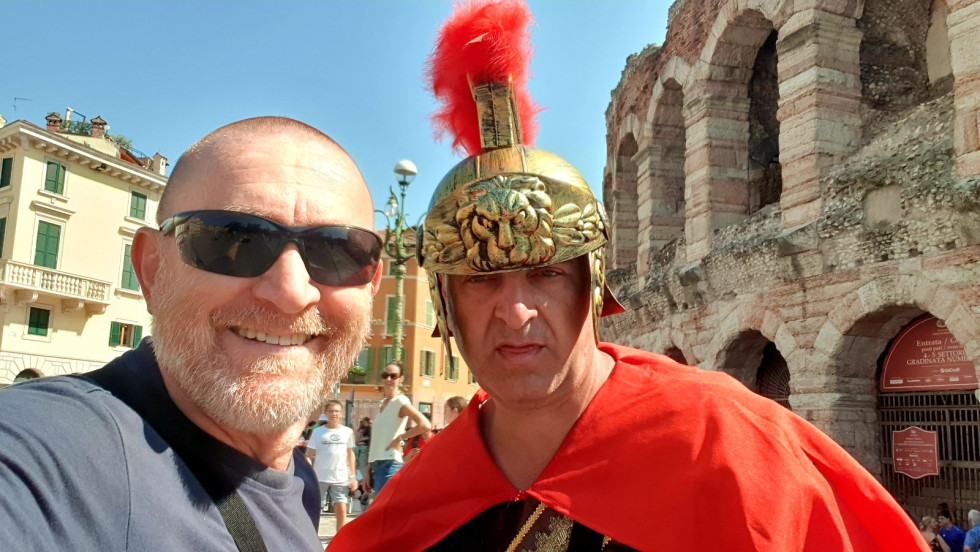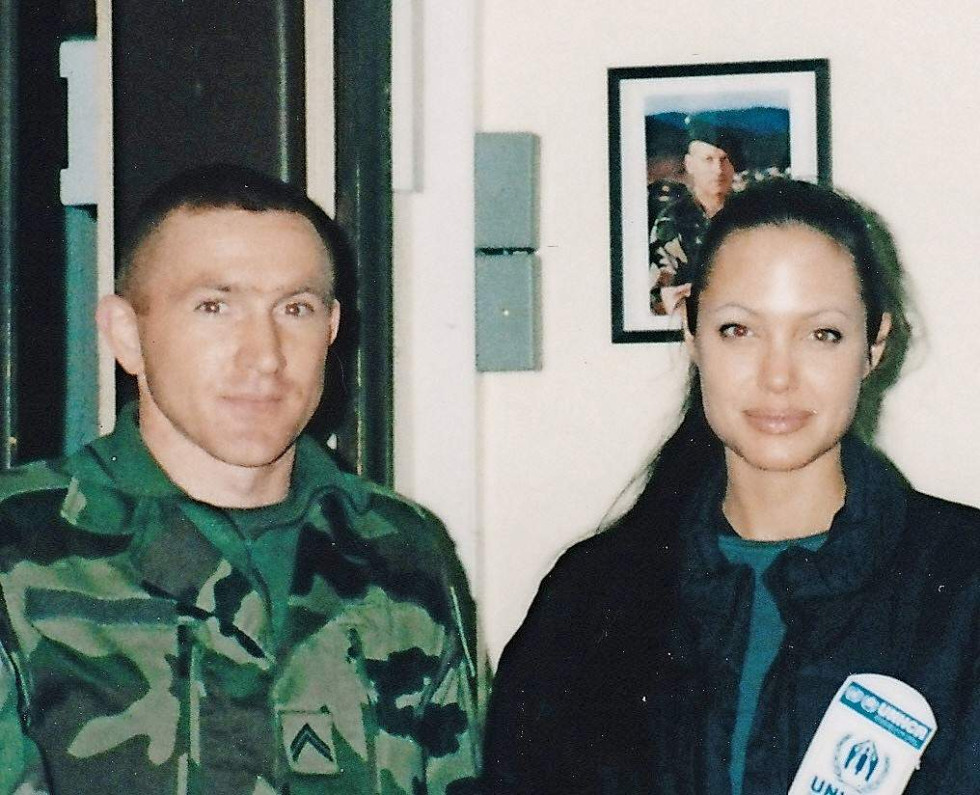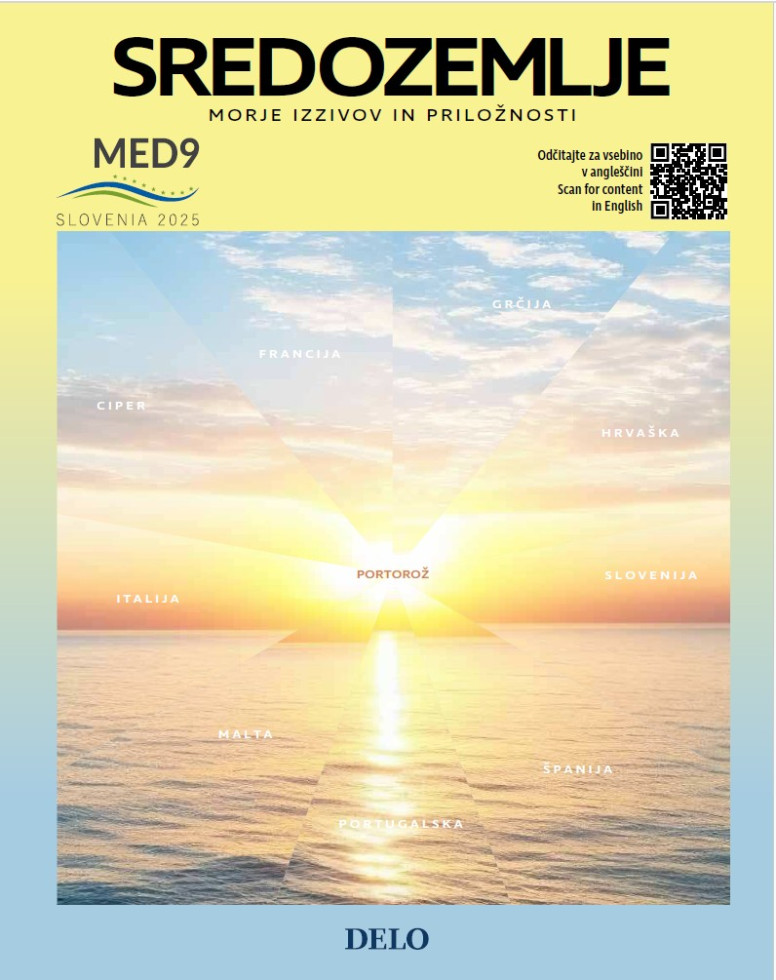He served in the Foreign Legion for 15 years and then stayed in his second homeland
In the book, he explains that the service which profoundly shaped his life is not a paramilitary group or a hotbed of hardened criminals, but a normal military organisation, which is an integral part of the French Armed Forces. Contrary to popular belief, the Legion's doors are firmly closed to criminals and terrorists, he assures.
"My divorce was a major turning point in my life. On top of that, the Slovenian economy was in pretty bad shape at the time, and although I had a relatively decent job, I never knew if I'd be the next to lose it. I knew life was harsh. I understood that the Legion was no joke, that you could even lose your life there, but at that time, I was ready for anything," says Markuš, describing his situation before leaving home.
A mix of emotions, anger and disappointment over his failures in life brought back the memories of when, as a young man, he had thought about joining the Foreign Legion. He thought it was better to live one day as a lion than his whole life as a sheep, so he took unpaid leave and bought a train ticket to the south of France, where he and a friend from Slovenia sought out the first base of the Foreign Legion in Marseille.
In his experience, the Foreign Legion is more interested in an individual's character traits than in their physical abilities. Because he came from the former Yugoslavia at a time when a bloody war was raging in the region, he had to wait longer than candidates from outside the Balkans to receive approval, following a demanding and detailed intelligence and security check, before being sent to the Foreign Legion's four-month basic training.
When you know you can do it, many things in life become easier
"The selection process is very tough. Of the eight of us who underwent the intelligence and security checks by the 'Gestapo', as we used to call the service that conducted the checks, only one was accepted. This ratio has become even stricter in recent years," says Markuš.
The four months of training were, to put it mildly, gruelling, but they went by incredibly quickly. "We ate against the clock, smoked against the clock, and by the evening, you'd fall asleep before you even hit the bed. The physical demands were extreme, but the mental challenges were even greater, since I didn't speak French, and all communication was in French. As you can imagine, there was no time to think about anything, neither the present nor the future, let alone call someone back home," says Markuš, who even began learning French during the very limited meal breaks.
The legionnaire's oath is not just a pledge but a kind of code of honour in which each member promises to serve France with honour; to regard fellow legionnaires as brothers in arms regardless of race, religion or nationality; to maintain their physical fitness; to be guided in battle not by passion but by professionalism; and to never abandon their wounded, their dead or their weapons in battle.
"In every activity, I always gave my all, not just for myself, but also for the people around me. That's how it was in the legion, and it has stayed with me forever. I never ran in the morning because I liked it or disliked it; it simply became a part of me," says Markuš, who stayed in the Legion for 15 years. Since part of his service was in an elite parachute unit, he was credited with more than 15 years due to enhanced years of service.
Terrorism brought him back home
After several contract extensions, he realised retirement was just around the corner and worked hard to earn a legionnaire's pension. Despite his retirement, he has continued to work and has been employed in the private security sector since 2008. After spending several years providing armed escort services to British ships and protecting them from pirate attacks in troubled areas of the world's oceans, he joined a French security company and returned home.
"After those two high-profile terrorist attacks in Brussels in 2016, recordings were found at one of the attackers' homes that showed terrorists were also interested in nuclear facilities. Based on this, France introduced stricter security measures for all facilities connected in any way to the nuclear sector," explains Markuš, who, together with his former legionnaire colleagues and under the auspices of a private security company, now guards one of the facilities of the French nuclear company Framatome.
He lives with his wife and three sons in a newly built house near the city of Nîmes in the south of France. For a while, he had planned to return to his hometown of Maribor, but he recently changed his mind, sold his house in Slovenia and decided to stay in his new homeland. In Nîmes, a city of around 150,000 inhabitants, which is considered the most Roman city outside of Italy, he feels at home, and the fact that the Mediterranean Sea is only around 40 kilometres away by car is, to him, a convincing enough reason to spend the rest of his life there.
Wealth is a country's curse
"France is an extremely wealthy country; in Europe, only Germany may have a higher standard of living. Unlike Germany, France has numerous military bases far beyond its borders, all of which are very expensive to maintain, and the country would not maintain them if it were not profitable. It is precisely this wealth that attracts immigrants from all over the world, not just from former French colonies, and as you probably know, the country is finding it increasingly difficult to manage the problem of illegal immigration," he says. He emphasises that personally, he has no problems with people of other nationalities and races, as he got along great with others and worked well in a really diverse environment both during his service in the legion and later.
As for his family, he believes they enjoy a decent solid middle-class life and lack nothing materially. His wife, also Slovenian, is a lawyer by profession and works as a court interpreter; together they earn a very good income, not counting his legionnaire's pension, to which he is entitled despite being in regular employment, as long as he does not take up employment in the police, army or gendarmerie. "Although our family is doing well financially, I must say that I am concerned about the negative trends we have been seeing over the last decade, and there are no signs that the situation in society will improve anytime soon," he says, critical of the country's governance and economy.
He is most concerned about the worsening security situation in France. Similar to other significantly larger and more notorious French cities, there are also some neighbourhoods in Nîmes where the police either do not dare to go or only enter with heavily armed reinforcements. "For too long, state authorities, hiding behind the excuse of tolerance, have turned a blind eye to drug dealers and organised crime. Crime has skyrocketed. Ordinary people fear and hate criminals and are rightly losing trust in state institutions, which is bad for everyone," reflects Markuš.
In his opinion, the most obvious proof of the security apparatus's failure is the two- to three-meter-high fences surrounding most elementary and secondary schools. Every pupil or student is reminded daily that the state is unable to ensure the safety of its most vulnerable citizens when they have to place their ID card on a reader to enter the school grounds. "Crime has spread like gangrene across all of France. I'm afraid it may be too late to cure this gangrene, and we all know how advanced gangrene is treated. It can't be done without a violent intervention into the body," he says vividly, admitting that he will remain a soldier at heart until he dies.
He is happy that he can afford to send his three children to a private school, where the chance of experiencing violent incidents is much smaller than at public schools. He knows he cannot follow his sons every step of the way, so he places great emphasis on teaching them how to live safely and survive on the streets of their hometown: "Prevention is key, in my opinion, and we talk about these issues a lot. The boys have already internalised that they should not look for trouble, so they mainly take buses to school and home that do not go through problematic neighbourhoods. I have taught them not to play the hero in critical situations. If someone threatens them on the street, they should calmly hand over their phone and whatever else is demanded. That's certainly better than being slashed or stabbed with a scalpel, which is a common weapon among such people."
How to stay safe in increasingly dangerous times?
Although he is aware that the fact that most parents raise their children in a similar way only reinforces the bullies' belief that the French are mostly cowards and gives them extra courage to continue their actions, Markuš sees no other way. From his own experience, he knows very well how people can become caught up in a dark and dangerous spiral of violence. No parent wants that for their child.
He wants his own and other children in France to be able to look forward to a future where they will live better than their parents, as was the case for the vast majority of generations in the past. "To survive in the future, they will need a lot of knowledge and even more critical thinking skills. Blind obedience will certainly not lead them to a better tomorrow," he says, highly critical of the actions of his government and the European administration. He fears that both Paris and Brussels will try to manipulate and intimidate people into seeing danger where there is none, while failing to recognise where the true threats lie. "While we are getting into debt and spending this money on armaments because we are supposed to be afraid that the Russians will attack the whole of Europe, people do not even notice how our quality of life is deteriorating. It is easier to manipulate a divided and frightened population."
Although he feels sorry for the Ukrainians and supports them in their patriotic defence, he finds the idea of France and other European countries sending their troops, their sons, there completely misguided. "I find it hard to believe that Russia will attack all of Europe after Ukraine, as claimed by the same people who, immediately after the start of the Russian invasion and the initial setbacks, insisted that the Russian army was on the brink of collapse and stuck in the Middle Ages, while the war has now lasted more than three years," says Markuš.
Where will he go in his old age when he can no longer work? "The Legion takes very good care of its people; among other things, it has its own retirement home. In old age, if I have nowhere else to go and if my family doesn't care for me, I know for sure that a room awaits me in the legionnaires' retirement home," he concludes the conversation with a laugh.





